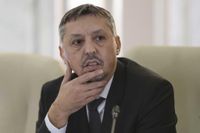In a recent discussion on Prima TV's Insider Politic show, Daniel David, Romania's Minister of Education, emphasized the significant progress made in improving educational facilities across the nation. He highlighted a stark difference from four to five years ago, when approximately 2,000 schools still had outhouses. David noted, "When I visited Satu Mare County recently, I found that no schools there have outhouses anymore." This initiative is part of a broader government strategy aimed at elevating education standards in Romania.
Daniel David revealed that the Ministry of Education has allocated funds in its budget for all remaining 70 schools with outhouses in 2025. "We are determined to ensure that all school units with such outdated facilities are included in the Ministry's programs for necessary changes," he confirmed. The funding is expected to be approved with a government resolution in the coming week or two.
David’s comments were not limited to educational facilities; he also addressed political aspirations and the potential to run for president. He stated, "I would have accepted the candidacy if I had been considered the best candidate to lead Romania in a Euro-Atlantic direction." Ultimately, the coalition nominated Crin Antonescu as their candidate for the presidency, leaving David to focus on his current role.
The Minister also disclosed the conditions he laid out in discussions with Ilie Bolojan, the leader of the National Liberal Party (PNL), before accepting his ministerial position. These conditions included a request for a marginally larger budget for education and the unification of the Education and Research ministries to enhance their effectiveness. David explained, "I see myself in the sphere of education, science, and culture, and it's vital to address these areas holistically by merging these ministries."
As negotiations unfolded within the ruling coalition for the presidential candidate, David, who was then rector of Babeș-Bolyai University in Cluj, stated that enhancing the Euro-Atlantic profile of the government was crucial, especially given Romania's complex political situation at the time. “Education and science must counter the bizarre influences of pseudo-science and pseudo-religion,” he opined, justifying the restructuring of the ministries.
During his interview, when asked whether he thought Bolojan would have been a better presidential candidate than Antonescu, David remarked, "I cannot engage in such discussions now. The coalition made its analyses and chose a candidate we must support as members or sympathizers.” He highlighted the importance of unity within the coalition, suggesting that discussion of alternatives could undermine their collective efforts.
David’s Political Landscape
Daniel David’s insight into the past political atmosphere and its evolution reveals a landscape where educational reforms are central to state priorities. As he expressed the clarity of purpose that guided coalition decisions, he maintained that the candidate chosen by the coalition represents a collective agreement, symbolizing the unity needed to face the challenges ahead.
With the backdrop of a renewed emphasis on educational development, David’s vision aligns with efforts to create a more robust educational framework. In the immediate future, his focus will remain on addressing the challenges facing the remaining schools with outhouses. He asserted, "In a week or two, we will incorporate all these schools into the Ministry's programs to address their needs."
The future success of educational reforms also hinges on local authorities, as the response to David's call for mayors to build new educational units with modern standards will be crucial. His pressing message underscores that substantive progress in Romania’s educational landscape hinges not only on the budget but also on local government engagement and public accountability.
As the political climate continues to evolve, Daniel David stands at the intersection of education and governance, pushing for reforms that align with both national aspirations and international expectations. This role serves as a critical element in shaping Romania's future on both educational and political fronts.
The Minister’s reflections on his aspirations and the conditions he set during his appointment reveal a leader focused on fortifying Romania’s educational foundation while staying aligned with broader geopolitical narratives. As he works to implement necessary changes, David embodies the idea that education is not just about facilities but about fostering a culture of excellence that prepares citizens for tomorrow.
Through these efforts, the implications of his ministry extend beyond the classroom as Romania continues to navigate its journey toward an improved educational system that meets the evolving needs of its society.





